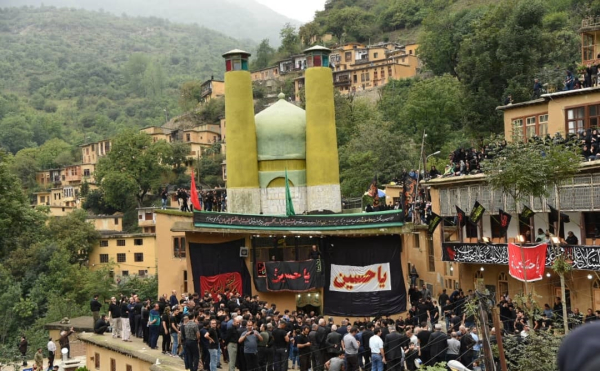 TEHRAN (Dispatches) -- Leader of the Islamic Revolution Ayatollah Seyyed Ali Khamenei has called on the three branches of the Iranian government to pool all resources of the country to build an "economy of resistance”.
TEHRAN (Dispatches) -- Leader of the Islamic Revolution Ayatollah Seyyed Ali Khamenei has called on the three branches of the Iranian government to pool all resources of the country to build an "economy of resistance”.
“With the endorsement of these policies, people are now waiting for their implementation and the positive effects of the implementation of the general policies of the resistance economy; therefore, the administration, the Majlis and the Judiciary must actively take action and peruse and practice their pertinent duties in each sector,” Ayatollah Khamenei said.
The Leader made the remarks in a meeting with the heads of the three branches of the Iranian government.
Ayatollah Khamenei said there is a great deal of hope that economic flourishing will occur in the medium term and will partially alleviate the people’s economic concerns if the policies of the resistance economy are implemented seriously.
The Leader advised the Majlis to identify and scrap any laws and regulations that run counter to those guidelines.
In a decree issued last week, Ayatollah Khamenei outlined the general policies of Iran’s “resistance economy”.
As part of the program, the government must take action in promoting “knowledge-based economy and domestic production, especially in strategic products and services, and the consequent reduction of dependence on imports”.
The decree also encourages greater privatization and increased exports of goods and services through legal and administrative reform as well as foreign investment for export purposes.
The following are some of the key objectives presented in this document:
-- Domestic capacity building with maximal utilization of the country’s resources, with a special focus on the participation of lower and middle-income classes in wealth generation
-- Promotion of a knowledge-based economy through drafting and implementing a comprehensive, scientific plan for the country and promoting innovation with the ultimate goal of becoming the No. 1 knowledge-based economy of the region
-- Increased efficiency in economic activity, improvement of economic competitiveness
-- Utilization of subsidy reforms to optimize energy consumption in the country, increase employment and domestic production and promote social justice
-- Improving Total Factor Productivity based on the empowerment of domestic human resources through skills education
-- Promotion of domestic production, especially in strategic products and services and the consequent reduction of dependence on imports
-- Provision of food and medicine security
-- Consumption management based on the promotion of consumption of local products parallel to the qualitative improvement of domestic production
-- Comprehensive reform of the financial system to respond to the country’s needs
-- Targeted promotion of exportable goods and services through legal and administrative reform as well as the promotion of foreign investment for export purposes
-- Increasing the economy’s resistance through regional and international economic collaboration, especially with neighbors but also through diplomacy
-- Reducing vulnerability of oil and gas exports through the selection of strategic buyers and involving the private sector in diversifying sales channels
-- Increasing oil and gas value-added exports
--- Increasing oil and gas strategic reserves and production to have an impact on international markets
-- Implementation of reforms to rationalize government costs, increase tax revenues and reduce dependency on oil and gas export revenue
-- Increasing the share of the National Development Fund from oil and gas export revenues
-- Increasing transparency in financial matters and avoid activities that pave the way for corruption
President Rouhani immediately reacted to Ayatollah Khamenei's decree and clarified tasks for a number of government institutions on how to plan and implement the needed policies. As is common in Iran’s governmental affairs, a number of committees and task forces have been established to follow up on the actions needed to achieve the above objectives.
Some analysts see the issuance of the decree as a reminder by the Leader that the positive outlook for nuclear negotiations should not derail the country’s overall effort to reduce its vulnerability to external sanctions, the Al-Monitor wrote.
"Indeed, a number of powerful stakeholders in Iran believe that sanctions generated an opportunity to become more focused and more efficient. As such, one can understand the timing and content of this initiative as a push not to allow the Iranian industry and government to fall back into a mentality of imports and maintain the momentum that has been generated through sanctions," the website said.
It is true that the term “economy of resistance” emerged as an Iranian response to the Western sanctions regime, and it is also valid that some of the above objectives are designed to strengthen the Iranian economy against external pressure. However, the majority of the above goals had already been defined in the country’s 20-Year Prospective Document (also known as Vision 2025), which had been passed and also decreed by Ayatollah Khamenei in 2005. Vision 2025 called on the Iranian government to pave the way for Iran to become a knowledge-based economy and the region’s top economic and technological power by 2025.
Partly due to misguided policies and partly due to external sanctions, Iran deviated far from the original goals of Vision 2025. Essentially, the decree should be seen as a top-level endorsement of the new government’s focus on comprehensive economic reform.
Incidentally, both in the original 2005 document and also in this recent decree, most of the stated objectives could also be part of an economic liberalization program. There are very few goals and reform objectives that are unique to Iran’s specific ideological context. However, the Islamic Republic of Iran has always focused on its unique literature, and “resistance economy” is a term to characterize the Iranian response to Western sanctions policies. A closer look at the proposed reform agenda underlines the regime’s desire to improve economic conditions, reduce vulnerabilities and promote competitive advantages.
No matter how we term these policies, the essence has been and remains domestic capacity building. The Iranian economy has the potential to move from its current below-average performance to becoming a developed economy. It has all the resources (natural, human and geostrategic) that an economy would need to play a much more significant role on the international stage. The missing links are in the areas of responsible and accountable policymaking, legal transparency and modern institutions. The Leader's decree addresses most of these issues.
The decree on the “resistance economy” should be seen as a new attempt by the top leadership of the Islamic Republic to provide the contours of Iran’s economic doctrine.

















